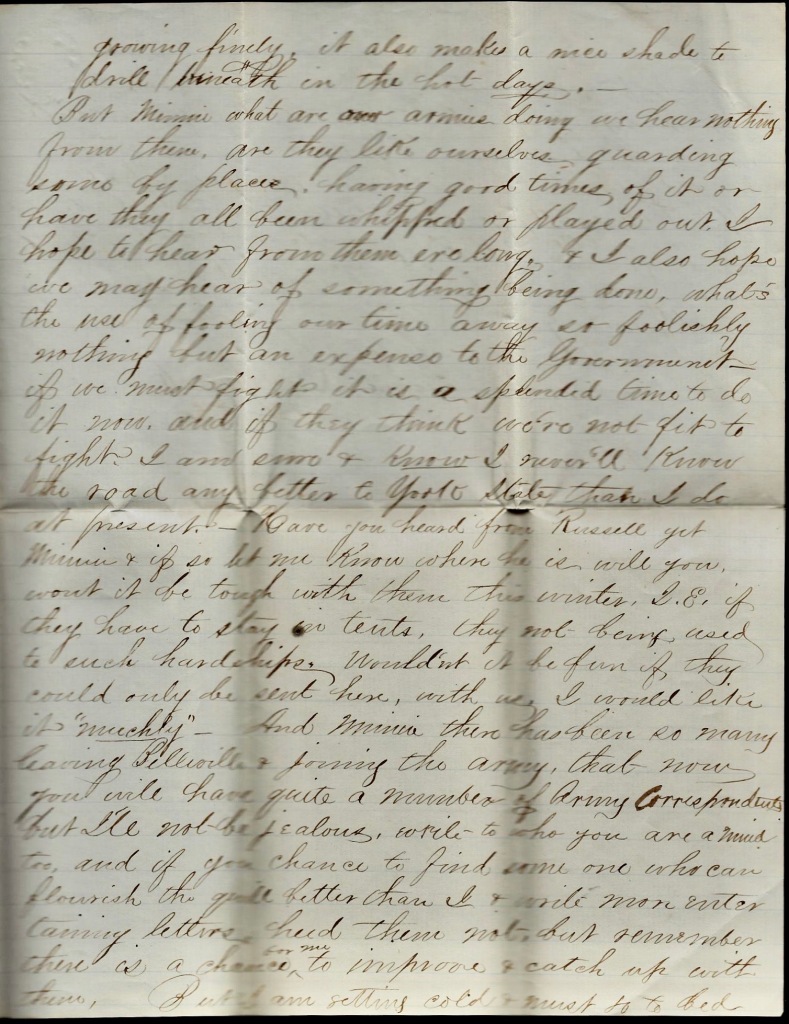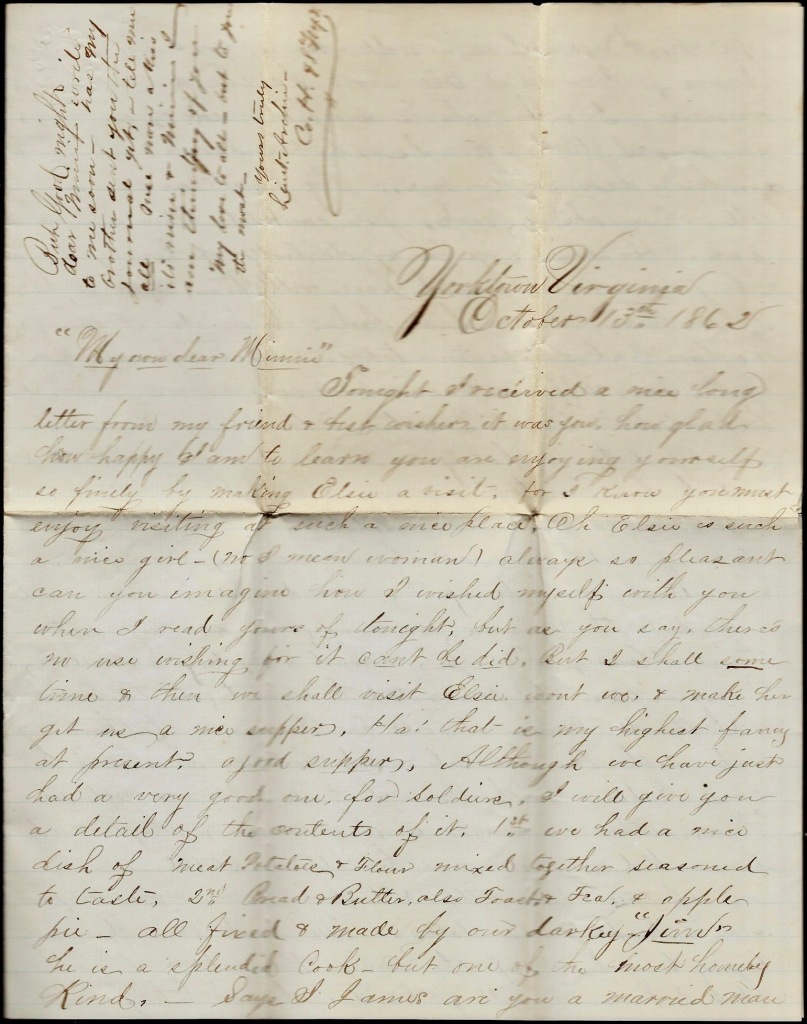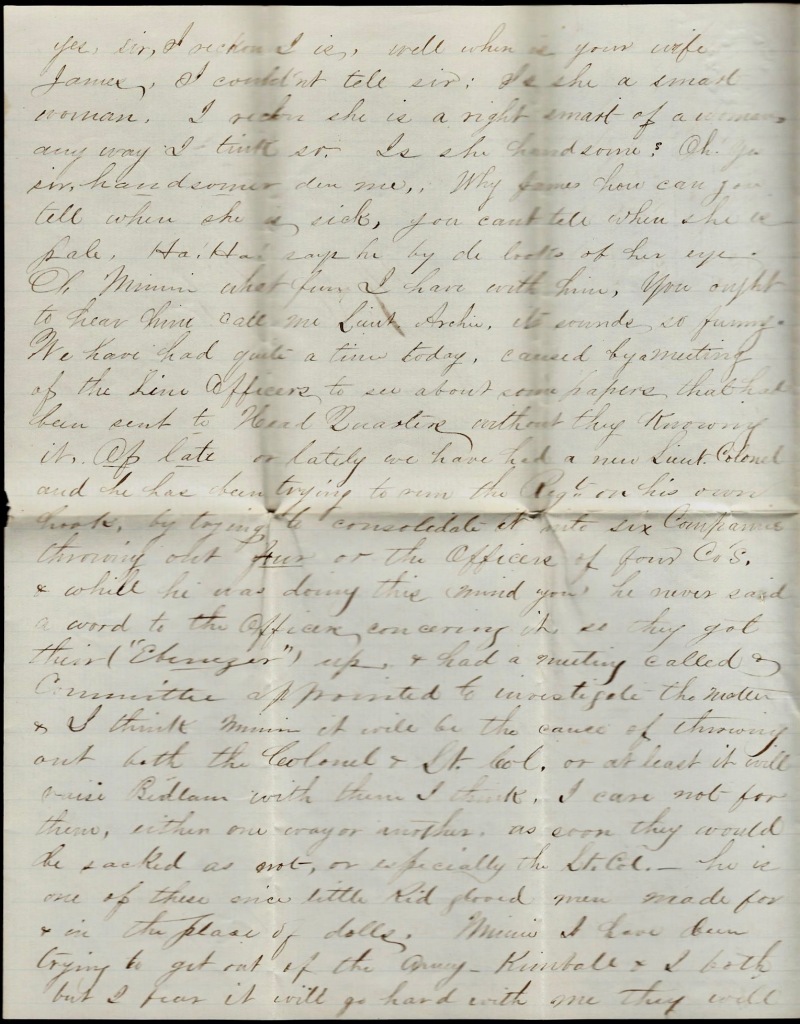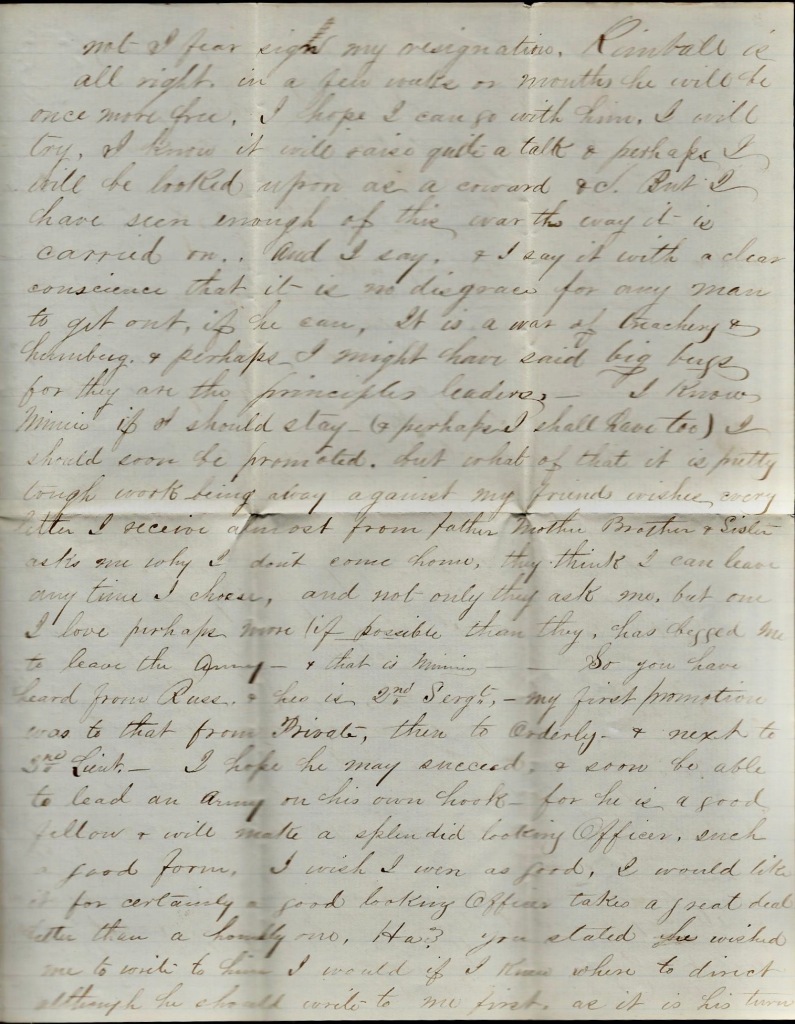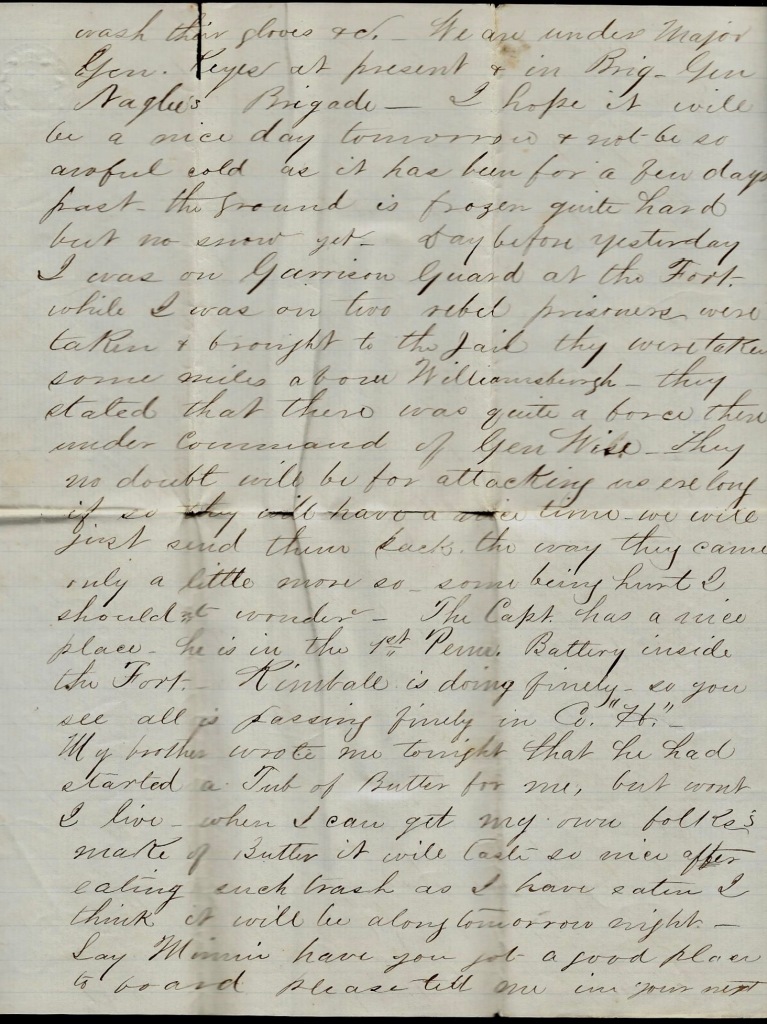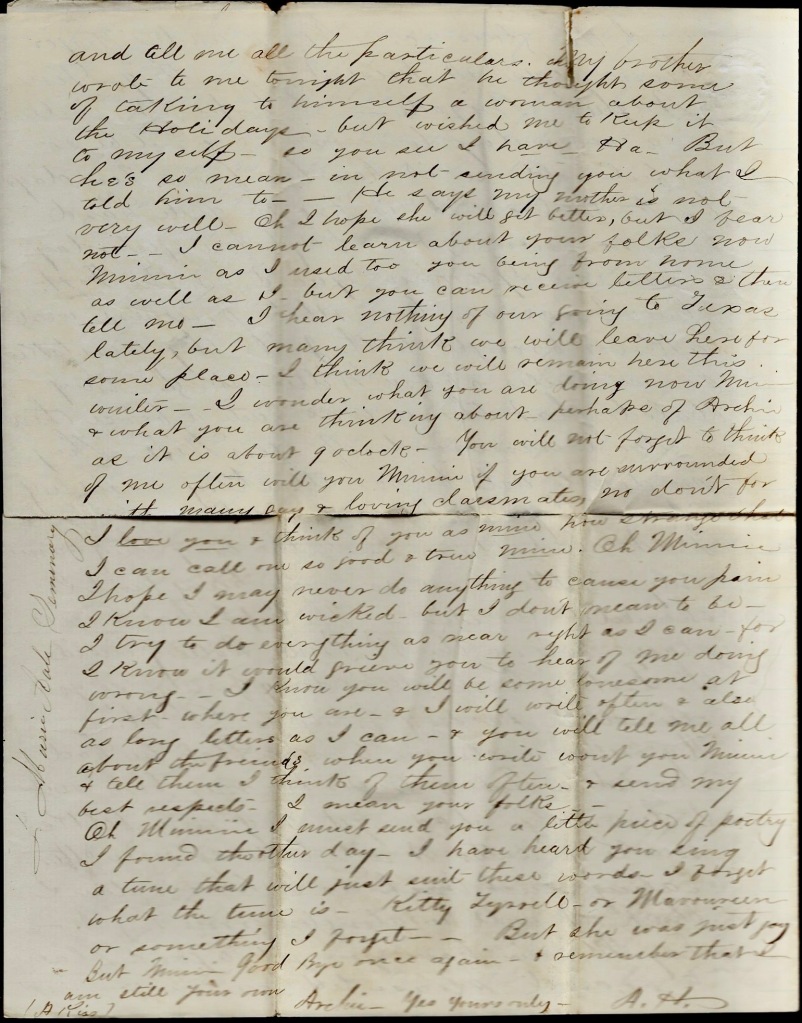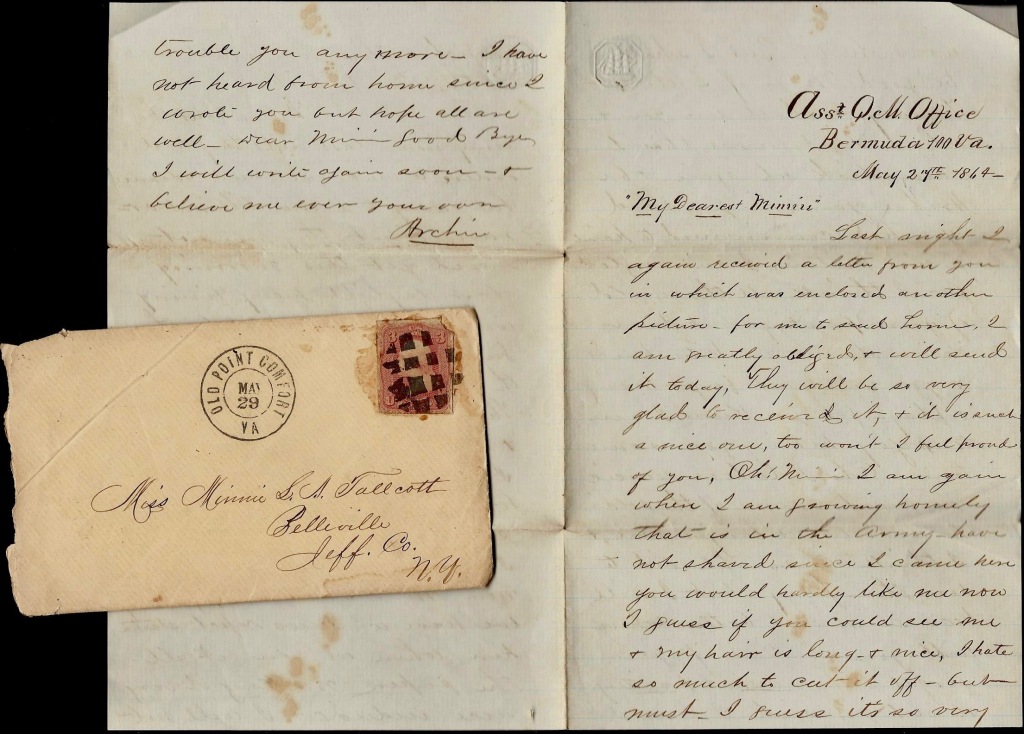
These letters were written by Archibald (“Archie”) Gillis Hollenbeck (1839-1901) who mustered in as a private in Co. H, 98th New York Infantry, on 16 October 1861 to serve three years. He was promoted to 1st Sergeant on 9 December 1861 and commissioned a 2d Lieutenant on 26 May 1862 (with rank to date from 30 April). He was discharged from the regiment on 16 April 1863.
Archie was the son of yeoman Alexander B. Hollenbeck (1811-1896) and Margaret Gillis (1815-1869) of Ft. Covington, Franklin county, New York. His father was born in Canada-West and his mother in Scotland. Archie wrote the letters to Amelia (“Minnie”) Lucy Ann Talcott (1843-1922) of Belleville, Jefferson county, New York. The couple were married in 1865 and by 1870 they resided in Buffalo, Dallas county, Missouri, where Archie earned a living as a physician. From 1878-1882, Archie served as the Circuit Court Clerk in Dallas county, and in 1874 he was the Superintendent of Public Schools.
From letter 3 we learn that Minnie attended the Music Vale Seminary in Salem, Connecticut. The school was opened in 1835 and operated until 1876. By the mid-1800s it had become a boarding school, teaching an average of eighty pupils per year. Graduating classes averaged twenty students. Students received instruction in harmony, notation, voice, and performance on instruments such as the piano, organ, harp, and guitar. The outbreak of the U.S. Civil War in 1861 reduced enrollment, as many of the school’s wealthy clientele had come from the South. The school’s buildings burned down in 1868, and though quickly rebuilt at a cost of $35,000-$40,000, the school faced competition from a plethora of other conservatories.
[A warning to readers: In the first two letters, Archie wrote extensively about his cook Jim—a former slave from Gloucester Point, Virginia. His mockery of Jim is somewhat difficult to read today for most people but was generally typical of the period.]
Letter 1
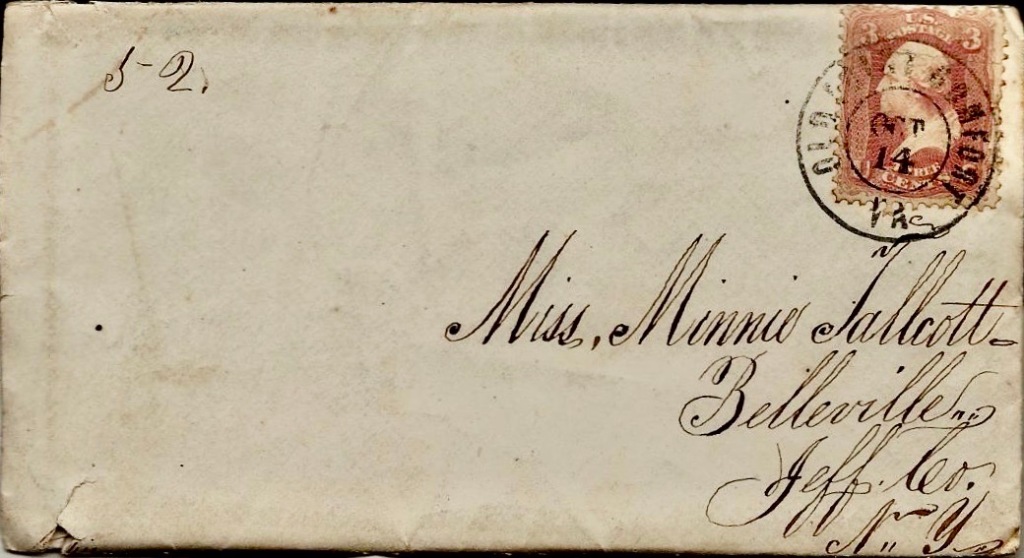
Yorktown, Virginia
October 11th 1862
My own dear Minnie,
It is Saturday night and is raining quite hard which makes it seem so lonesome. The Captain is near me writing home & all is still & quiet within our little tented house. But Minnie, it is cold and chilly—not stoves to warm ourselves by. Oh! just think when you are snugly sitting by your nice warm fires how your Archie is in nothing save a cloth tent with nary a stove or fire to make him warm. But I am happy when I feel well if we have some hard times.
Tomorrow I shall be Officer of the Guard again and tomorrow it is our day of grand inspection (Sunday inspection) when every man must be on parade—waiters, cooks, & all. So we must dress up our ‘nigger’ and have him out—not for his good looks though by any means for he is one of the most homely kind. But we must have him out. He is quite a funny fellow. He calls me Lieut. Archie. It sounds so funny. He used to be a slave on Gloucester Point. He says he is going home with me when I go. And then he is the best cook on the ground—if he don’t get up some of the best stews you ever saw—and then the advantage of having him black is we cannot tell whether his hands are dirty or not, where if he were white, it would look bad to see the dirt, and our appetites would not be so strong for the food he had prepared. Am I not right?
Oh! no letter for me tonight. What’s the matter now? Have they failed to send them or have they stopped corresponding with me? But I guess it’s only my ill luck for tonight. Tomorrow night I must have 1 or 2 couple missiles—I mean missives. Say Minnie, would you like to have me send you a ring made from the root of the great renowned tree in which the negro was shot by California Joe—the great sharpshooter? 1 Nothing nice—only it’s my own whittling & the place from which it came will make it perhaps a nice little keepsake. I have me a pipe made from one of its roots. It is an immense tree. Last week I was out drilling with our company and I thought I would try and see how many men could get in the hollow of it & I actually marched 8 men into with guns in their hands so they were completely hid from sight. It is still alive and seems to be growing finely. It also makes a nice shade to drill beneath in the hot days.

But Minnie, what are our armies doing? We hear nothing from them. Are they like ourselves—guarding some by place, having good times of it, or have they all been whipped or played out? I hope to hear from them ere long & I also hope we may hear of something being done. What’s the use of fooling our time away so foolishy? Nothing but an expense to the government. If we must fight, it is a splendid time to do it now, and if they think we’re not fit to fight, I am sure & know I never’ll know the road any better to York State than I do at present.
Have you heard from Russell yet, Minnie, and if so, let me know where he is will you. Won’t it be tough with them this winter—i.e., if they have to stay in tents—they not being used to such hardships? Wouldn’t it be fun if they could only be sent here with us? I would like it “muchly.” And Minnie, there has been so many leaving Belleville & joining the army that now you will have quite a number of army correspondents. But I’ll not be jealous. Write to who you are a mind to and if you chance to find someone who can flourish the quill better than I and write more entertaining letters, heed them not, but remember there is a chance for me to improve & catch up with them.
But I am getting cold and must go to bed for that is the only way I can get warm. It is raining hard yet and looks as if our fall rains had set in. Won’t we have a nice muddy time. But Minnie, give my respects to all—especially your own folks. Tell Charley I will send him some little Virginia memento if I can find any. And again I say goodbye, while I say I am yours and yours truly, — Archie Hollenbeck
To Minnie
1 “One sharpshooter in particular made life miserable for the Rebels, an unusual fellow named Truman Head, but better known to his comrades as “California Joe” or “Old Californy.” Head, so the story went, had moved out West after a lover jilted him, then struck it rich in the gold fields. When the war began, the 52-year-old came back East, lied about his age—claiming to be 42—and joined Berdan’s men, carrying a Sharps rifle he had bought with his own money. Since he had no family, Head had left $50,000 in a trust for the care of Union soldiers in case he was killed. California Joe was well liked and highly respected by his comrades, and his name appears in many sharpshooter accounts of Yorktown. One marksman remembered that slaves who had escaped from the Confederate lines told of a day of slaughter on April 5, when “out of a whole company that worked the guns in a battery near the peach orchard…only 12 were fit for duty the next morning. It was on that occasion that ‘Old Californy’ did such splendid service.” [Source: Killers in Green Coats, HistoryNet]
I could not find an period newspapers that spoke of California Joe shooting a negro marksman from a tree at Yorktown. I did find numerous May 1862 articles that appeared to refer to the same incident that occurred during the seige of Yorktown in which a negro was shot from a tree by a member of Berdan’ Sharpshooters but they do not attribute the shot to California Joe. Here is one that was published in the Mobile Register and copied from the Baltimore American. It read, in part, “…for the enemy [referring to Confederates] is by no means without good marksmen, some of whom have a skill that rivals ‘old California Joe,’ and would try the skill of Col. Berden himself. One of these was a stalwart negro who accurate firing made him the dread as well as the admiration of our own crack marksmen….At any practicable range, with the least sight of our men, he seemed to know no such thing as failing to hit. Happily he is no more. Two days ago, after watching and waiting with the patience and perseverance which not but the practiced rifle picket can exercise, he exposed himself for a moment, and was tumbled over with a ball through the head.” But then the article says this marksmen was moments later killed by a Confederate sharpshooter so it could not have been California Joe—if the version is to be believed. I suspect that by the time Archie’s regiment occupied Yorktown in the winter of 1862-63, the story was more legend that factual.
Letter 2
Yorktown, Virginia
October 13th 1862
My own dear Minnie,
Tonight I received a nice long letter from my friend & best wisher—it was you. How glad, how happy I am to learn you are enjoying yourself so finely by making Elsie a visit for I know you must enjoy visiting at such a nice place. Oh, Elsie is such a nice girl—(no, I mean woman)—always so pleasant. Can you imagine how I wished myself with you when I read yours of tonight. But as you say, there’s no use wishing for it can’t be did. But I shall some time & then we shall visit Elsie, won’t we, and make her get us a nice supper. Ha! that is my highest fancy at present—a good supper. Although we have just had a very good one for soldiers. I will give you a detail of the contents of it. 1st we had a nice dish of meat, potatoes, and flour mixed together, seasoned to taste. 2nd, bread and butter, also toast & tea, and apple pie—all fixed and made by our darky, “Jim,” He is a splendid cook but one of the most homely kind.
Says I, “James, are you a married man?”
“Yes sir, I reckon I is.”
“Well, where is your wife, James?”
“I couldn’t tell, sir.
“Is she a smart woman?”
“I reckon she us a right smart of a woman—anyway I think so.”
“Is she handsome?”
“Oh yes sir, handsomer den me.”
“Why James, how can you tell when she is pale?”
“Ha ha,” says he, “By de looks of her eye.”
Oh Minnie, what fun I have with him. You ought to hear him call me Lieut. Archie. It sounds so funny.
We have had quite a time today caused by a meeting of the line officers to see about some papers that had been sent to Headquarters without they knowing it of late, or lately. We have had a new Lieut. Colonel and he has been trying to run the regiment on his own hook by trying to consolidate it into six companies, throwing out four, or the officers of four companies, & while he was doing this, mind you, he never said a word to the officers concerning it. So they got their (“Ebenezer”) up and had a meeting called & committee appointed to investigate the matter & I think Minnie it will be the cause of throwing out both the Colonel and Lt. Colonel, or at least it will raise Bedlam with them I think. I can not for them, within one way or another, as soon as they would be sacked as not, or especially the Lt. Colonel. He is one of these nice little kid gloved men made for & in the place of dolls.
Minnie, I have been trying to get out of the army—Kimball and I both—but fear it will go hard with me. They will not I fear sign my resignation. Kimball is all right. In a few weeks or months he will be once more free. I hope I can go with him. I will try. I know it will raise quite a talk & perhaps I will be looked upon as a coward &c. But I have seen enough of this war—the way it is carried on. And I say, & I say it with a clear conscience—that it is no disgrace for any man to get out if he can. It is a war of treachery & humbug & perhaps I might have said big bugs for they are the principle leaders. I know, Minnie, if I should stay (and perhaps I shall have to) I should soon be promoted. But what of that. It is pretty tough work being away against my friends wishes. Every letter I receive almost from Father, Mother, Brother and Sister asks me why I don’t come home. They think I can leave anytime I choose, and not only they ask me, but one I love perhaps more (if possible) than they has begged me to leave the army—and that is Minnie.
So you have heard from Russ and he is 2nd Sergeant. My first promotion was to that from private, then to Orderly, & next to 2nd Lieutenant. I hope he may succeed & soon be able to lead an army on his own hook for he is a good fellow and will make a splendid looking officer—such a good form. I wish I were as good. I would like it for certainly a good-looking officer takes a great deal better than a homely one. Ha. You stated he wished me to write to him. I would if I knew where to direct although he should write to me first as it is his turn.
Minnie, I am sitting in my tent, lonely, thinking of the past—of those many happy hours that were all too good to last. How sad. Oh, say Minie, did John Freeman enlist? You never told me. Please let me know. What a nice little soldier he will make. No ball could ever hit him Sometimes I think how he must feel towards me for going there as I did and commence going with you when he was, as I suppose he thought, on the pint of making a proposition. Ha. I would like to have seen it, wouldn’t you? How he used to look at me when I was with you & try to get you away. I know it—but it’s past. I think him a good fellow and I hope a Christian—what he professes to be.
They are singing in the next tent to ours and it sounds nicely. Singing Evelina and also playing a game of euchre. The Captain is Officer of the Day & is now in the tent with me, lying down resting, and has been talking to me about Minnie. Says, my George! I would like to see her. I told him I bet he wouldn’t. Well, he says, if I do, tell her I was your captain. Then I could. Could he Minnie? He has a little daughter named Minnie.
I am quite out of news, Minnie. Therefore, I will soon have to close. And now, don’t think me in any danger here, but just rest assured I shall take good care of myself on your account for I think if it were not for you, I son would be a hard and disheartened fellow in many ways. How many times the officers have met together nights and would buy bottles of the poisonous draught & imbibe, until the small hours, while I alone would go to my tent & think, now there is no use of me doing it if they do. (I have done it, I have done it) And am Archie still.
But good night, dear Minnie. write to me soon. Has my brother sent you the Journal yet? Tell me all. Yours truly, — Lieut. Archey, Co. H, 98th New York
Letter 3
Yorktown, Virginia
December 8th 1862
My own dear Minnie,
Tonight I am happy. No doubt you will say why. I will tell you. It is for this reason. I have heard from my own Minnie. Yes, tonight’s mail brought me 3 letters from you written since you arrived at the Vale. I also received 2 from home so you see I had quite a lot of reading “matter” for this night. Oh innie, I am glad you are at the [Music] Vale [Seminary] at last. I hope you will enjoy yourself very much and if you have got a good place and have all things comfortable, I am satisfied & will be and do all I can to make myself worthy of your love. Minnie, I am well and am still in command of the company. The men have finished their barracks and have moved into them. They are warm and comfortable. I am still in a tent but expect soon to have a different place. They boys say they are going to build me a nice little house for the winter made of logs. Won’t it be gay (i. e.) when it’s done?
You must have had a nice journey while going to Vale. You passed splendid scenery & many romantic places, all of which no doubt you had a passing view of. And your stop in Albany no doubt had an inkling to the pleasure of your travels. You stopped at the house while there that I have often stopped in. It is a splendid place. Oh Minnie, my greatest wish is I may be spared to have the pleasure of accompanying you home when you return. Then no scenery can be passed unnoticed. We will live in hopes, won’t we? How long do you intend to stay–a year or more? Please tell me.
You ask me to try and get some photographs taken and send you one. Most assuredly I will but I fear I cannot get any for a long while as there are no artists in this section at present. But we expect one to come here. Oh that one I received from you is such a nice one. you can’t imagine how much I love to look at it & I wish it was the original. But I cannot see the original for a long time, can I?
But I have just received an order stating that tomorrow morning at half past 9 there is to be a grand review at Gloucester Point by Major General Dix, Military Governor of this army, or the Army at Fortress Monroe & this place. So I must have the men slick up some tonight—black their boots, wash their gloves, &c. We are under Major Gen. Keyes at present and in Brig. General Naglee’s Brigade. I hope it will be a nice day tomorrow & not be so awful cold as it has been for a few days past. The ground is frozen quite hard but no snow yet.
Day before yesterday I was on Garrison Guard at the Fort. While I was on, two rebel prisoners were taken & brought to the jail. They were taken some miles above Williamsburg. They stated that there was quite a force there under command of Gen. Wise. They no doubt will be for attacking us ere long. If so, they will have a nice time, We will just send them back the way they came—only a little more so—some being hurt, I shouldn’t wonder. The Captain has a nice place. He is in the 1st Pennsylvania Battery inside the fort. Kimball is doing finely. So you saee all is passing finely in Co. H.
My brother wrote me tonight that he had started a tub of butter for me, but won’t I live when I can get my own folk’s make of butter? It will taste so nice after eating such trash as I have eaten. I think it will be along tomorrow night. Say, Minnie, have you got a good place to board? Please tell me in your next and tell me all the particulars.
My brother wrote to me tonight that he thought some of taking to himself a woman about the Holidays but wished me to keep it to myself. So you see I have — Ha. But he;s so mean in not sending you what I told him to. He says my mother is not very well. Oh I hope she will get better, but I fear not.
I cannot learn about your folks now, Minnie, as I used to, you being from home, as well as I. But you can receive letters & then tell me.
I hear nothing of our going to Texas lately, but many think we will leave here for some place. I think we will remain here this winter. I wonder what you are doing now, Minnie, & what you are thinking about—perhaps of Archie as it is about 9 o’clock. You will not forget to think of me often, will you Minnie, if you are surrounded with many loving classmates. No, don’t, for I love you and think of you as mine. How strange that I can call one so good and true mine. Oh Minnie, I hope I may never do anything to cause you pain. I know I am wicked, but I don’t mean to be. I try to do everything as near right as I can for I know it would grieve you to hear of me doing wrong. I know you will be lonesome at first—where you are—& I will write often & also as long letters as I can. And you will tell me all about the friends when you write, won’t you Minnie, and tell them I think of them often, and send my best respects. I mean your folks.
Oh Minnie, I must send you a little piece of poetry I found the other day. I have heard you sing a tune that will just suit these words. I forget what the tune is. Kitty Tyrell or Maroureen or something—I forget. But she was just joy. But Minnie, goodbye once again. And remember that I am still your own, — Archie
Yes, yours only, — A. H.
Music Vale Seminary
Letter 4
Albany, New York
September 2nd 1863
My dearest Minnie,
Never before have I had occasion to write as I am about to write at present. Oh! too sad a tale I have to write. My dearest sister, plucked as it were in the prime of life. Too pure for earth. God called her home. Yes, my sister Hannah next to the oldest—about 17 years of age—only sick a little over a week. She was taken on Monday with a fever which crazed her brain so much so that at times she seemed quite crazy. On Wednesday I received a telegram to hurry home which I did, arriving home Thursday night. I went to her bedside and spoke to her. She knew me and asked me to kiss her. Oh! Then I knew too well she could not live. And no not long did she live.
We watched over her until Friday night about 11 o’clock when death came & robbed her of her bloom. How sad. But not all has yet been told. Immediately across the way from our home there lay my brother seeming to be almost upon his death bed, sick with the Typhoid Fever. Thought he could not live. He did not see our sister at all after she was sick. Was it not sad? And my mother—what can I say of her? Oh! you know already feeble as she was before—how much more so now.
Have I not passed the last two weeks most mournfully? Words cannot describe it. It is too sad a tale and I cannot write. My brother is some better now but very sick yet. Also my mother. I came from home yesterday morning, arriving at Albany this A.M. You will excuse me for not writing before & not writing longer this time, won’t you Minnie?
Goodbye. I am your Archie.
Letter 5
Asst. Quarter Master Office
Bermuda 100, Va.
May 27th 1864
My dearest Minnie,
Last night I again received a letter from you in which was enclosed another picture—for me to send home. I am perfectly obliged & will send it today. They will be so very glad to receive it & it is such a nice one too. Won’t I feel proud of you. Oh! Minnie, I am going where I am growing homely—that is, in the army. Have not shaved since I came here. You would hardly like me now I guess if you could see me and my hair is long & nice. I hate so much to cut it off but must, I guess. It’s so very warm here. But I shall be good, Min, if I do get homely & shall love you and when I get home, then I can slick up again & be Archie again/
You said you had commenced to paint a nice picture. I am so glad for I think all the world of your painting. But dear Minnie, do not work too hard & you must not forget to sing & play for you know I am to enjoy hearing you sometime. Oh I do love music so much. Some of the soldiers have violins & banjoes here & I think it so splendid to have them play. But I will hear so much better when with you. But if you forget both music and painting, do not get sick. I would much rather you would forget both than be sick.
Well about the army now. Last night they had orders to make one grand advance but owing to some different arrangement, they have not moved yet. This morning about daylight, heavy firing was heard—supposed to be the gunboats. Have not heard the result, but hope all right. The troops are in a fine condition & the roads quite passable so I think we can stand a good fight.
I received the papers you sent me for which I am greatly obliged. And now Minnie, I am happy to say we have a News Depot started here where we can get all the papers, making it very nice indeed & I will not trouble you anymore.
I have not heard from home since I wrote you but hope all are well. Dear Minnie, goodbye. I will write again soon & believe me ever your own, — Archie



